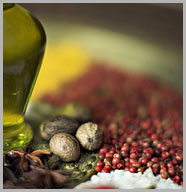 The world today is discovering an increasing growth of stress, conflict and ill health. But at the same time, there is also an increasing spiritual awareness and the need to live and think holistically.
The world today is discovering an increasing growth of stress, conflict and ill health. But at the same time, there is also an increasing spiritual awareness and the need to live and think holistically.
This is one of the main reasons why Ayurveda today, is making a strong comeback, not only in India, but all over the western world.
AYURVEDA is a Sanskrit word derived from two roots: “Ayus” and “vid”, meaning life and knowledge respectively. It is a combination of science and philosophy, which details the many physical, mental, emotional, and spiritual components necessary for healing. Ayurveda, therefore, represents a ‘science of knowledge’ pertaining to the body, the sense organs, the mind and the soul. Broadly speaking, it includes herbal medicines, dietetics, psychology, astrology and treatment using medicine and mantras.
The Vedas are ancient Hindu books of knowledge that are said to have been divinely revealed to the sages of India many thousands of years ago.
They contain within them the knowledge, the rhythm, and the structure of the universe and the secrets of sickness and health. Ayurveda, is part of ‘Atharva Veda’, (a Vedic system in practice before 4000 B.C.) which deals with Holistic living.
Drugs in the Ayurvedic system of medicine fall into three groups: vegetable products, products and animal products of mineral origin.
Vegetable products: plants, fruits, flowers, creepers.
Animal products: honey, wax, oils.
Drugs from minerals: metals like gold, silver, copper, iron, lime and gems
In Ayurvedic medicine each person is treated individually. Treatment is aimed at restoring the disturbed mechanism. The skill of the practitioner lies in assessing and identifying the individuals’ constitution (doshas), diagnosing causes of any imbalance and then deciding on the best possible treatment. It aims not only to cure diseases but also to create health and well-being.
Some of the elements of Ayurvedic medicine include:
- Detoxification by Panchakarma
- Diet
- Yoga
- Herbal medication and therapies
- Meditation and prayer
Good health, according to Ayurvedic philosophy, is a state of balance between the mind, body, spirit, and environment. This balance, or harmony, is achieved through medicine, diet, yoga, lifestyle and meditation.
An Ayurvedic doctor can feel your pulse and instantly detect constitutional imbalances. The pulse diagnosis is amazing! It can be decoded to expose any physical and mental condition from the condition of your liver or stomach, to the functioning of your right ventricle of the heart or the left side of the thyroid. It can even detect the state of your mind-- sad, depressed or happy.
 Ayurveda encourages the external application of oils such as the abhyanga (sesame) or coconut oil. Application or massage of these oils nourishes the body and calms the mind. Another benefit is regular use increases elasticity of the muscles and ligaments and also helps to strengthen the bones.
Ayurveda encourages the external application of oils such as the abhyanga (sesame) or coconut oil. Application or massage of these oils nourishes the body and calms the mind. Another benefit is regular use increases elasticity of the muscles and ligaments and also helps to strengthen the bones.
The word, panchakarma arises out of two Sanskrit words: panch, meaning “five”, and karma meaning “action”. Panchakarma refers to five purificatory therapies used to cleanse the system and regain harmony of body and mind.
Pachakarma therapy, is a unique method of complete detoxification, and, is, as the Ayurvedic practitioners believe, the most effective system ever developed for the management and prevention of disease.
The five steps are:
- Sneehana (Oleation): Medicated ghee consumed for softening of the doshas.
- Virechana (Laxative): A laxative taken to cleanse the toxins from the body.
- Abhyanga (oil massage): A massage to loosen the excess toxins from the body.
- Swedana (Sweat treatment): A steam bath to open the pores for elimination of toxins.
- Basti (Enema): An enema, to flush the loosened toxins out through the intestinal tract.

